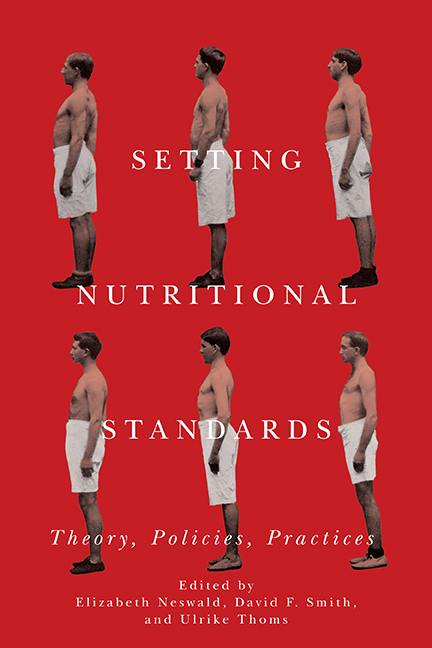Book contents
- Frontmatter
- Contents
- Acknowledgments
- Introduction
- 1 Nutritional Knowledge between the Lab and the Field: The Search for Dietary Norms in the Late Nineteenth and Early Twentieth Centuries
- 2 How Vegetarians, Naturopaths, Scientists, and Physicians Unmade the Protein Standard in Modern Germany
- 3 Of Carnivores and Conquerors: French Nutritional Debates in the Age of Empire, 1890–1914
- 4 Setting Standards: The Soldier's Food in Germany, 1850–1960
- 5 The Quest for a Nutritional El Dorado: Efforts to Demonstrate Dietary Impacts on Resistance to Infectious Disease in the 1920s and 1930s
- 6 “Not a Complete Food for Man”: The Controversy about White versus Wholemeal Bread in Interwar Britain
- 7 “Proscribing Deception”: The Gould Net Weight Amendment and the Origins of Mandatory Nutrition Labeling
- 8 When Is a Famine Not a Famine? Gauging Indian Hunger in Imperial and Cold War Contexts
- Selected Bibliography
- List of Contributors
- Index
4 - Setting Standards: The Soldier's Food in Germany, 1850–1960
Published online by Cambridge University Press: 18 April 2018
- Frontmatter
- Contents
- Acknowledgments
- Introduction
- 1 Nutritional Knowledge between the Lab and the Field: The Search for Dietary Norms in the Late Nineteenth and Early Twentieth Centuries
- 2 How Vegetarians, Naturopaths, Scientists, and Physicians Unmade the Protein Standard in Modern Germany
- 3 Of Carnivores and Conquerors: French Nutritional Debates in the Age of Empire, 1890–1914
- 4 Setting Standards: The Soldier's Food in Germany, 1850–1960
- 5 The Quest for a Nutritional El Dorado: Efforts to Demonstrate Dietary Impacts on Resistance to Infectious Disease in the 1920s and 1930s
- 6 “Not a Complete Food for Man”: The Controversy about White versus Wholemeal Bread in Interwar Britain
- 7 “Proscribing Deception”: The Gould Net Weight Amendment and the Origins of Mandatory Nutrition Labeling
- 8 When Is a Famine Not a Famine? Gauging Indian Hunger in Imperial and Cold War Contexts
- Selected Bibliography
- List of Contributors
- Index
Summary
In his classical work on military tactics, The General Principles of War, Friedrich the Great (1712–86) stated that anyone wanting to build an army must start with the belly. Procuring sufficient food was crucial in warfare, since food supply influenced both the soldiers’ performance and their morale. Nevertheless, provisions were basic. Friedrich's soldiers were supplied with just two pounds of bread per day, and food procurement and preparation were largely left to the individual soldier. Military food consumption thus followed traditional, regional, and social differences. Whereas officers ate in restaurants, with their families, or with householders, the common soldiers prepared their foods in cooperative cooking communities called Menagen. They purchased food collectively and hired a cook or cooked in turn. As a result, the peacetime food of regular soldiers was similar to that of the civilian population. It was shaped by custom and varied according to rank.
During wartime, food was requisitioned from the civilian population, which was obligated to accommodate soldiers and reimbursed for its expenses. The army organized food provision only when larger forces were assembled and where opportunities for self-catering or quartering seemed uncertain. This began to change only during the eighteenth century, after the establishment of standing armies and permanent barracks. Two decrees, announced in 1827 and 1831, emerged from these changes and opened the possibility that some food would be centrally supplied during campaigns. However, the state did not provide complete and healthy food in peacetime. When the army supplied only bread, soldiers continued to purchase the rest of their food from marketers in or near garrisons, and marketers accompanied the army on military campaigns. More fundamental change had to wait until 1858 when the food provision regulation (Verpflegungsreglement) was enacted.
This essay follows developments in the soldier's rations between 1850 and 1960, focusing not on organizational changes but on scientific and medical discourses on dietary standards, which began in the middle of the nineteenth century. Two developments shaped these discourses. They were, first, deeply influenced by the Crimean War (1853–56). Military tactics had changed from static to mobile warfare, and the experiences of the war showed that the military was unable to supply adequate food to its more mobile troops.
- Type
- Chapter
- Information
- Setting Nutritional StandardsTheory, Policies, Practices, pp. 97 - 118Publisher: Boydell & BrewerPrint publication year: 2017

